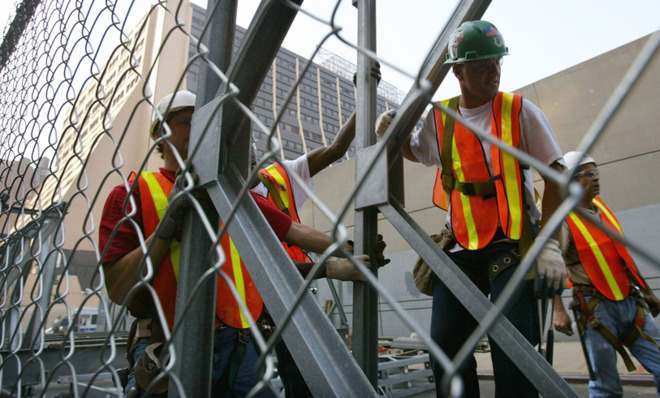The sluggish economy's hidden toll on women
The recession hit men harder than women. The recovery may be having the opposite effect.


A free daily email with the biggest news stories of the day – and the best features from TheWeek.com
You are now subscribed
Your newsletter sign-up was successful
The economy added 113,000 jobs in January, helping to bring down the unemployment rate to 6.6 percent.
On the surface, that was a positive sign, even if the raw number of jobs created was a bit underwhelming. Yet the growth belied a troubling trend in the job market for women, which reveals how the economic recovery hasn't been entirely gender-neutral.
Despite a net gain of 164,000 jobs for men in January, women actually lost 51,000 jobs over the same period. Though an extreme case, it's indicative of a longer-term trend of men accounting for the lion's share of new jobs created since the recession technically ended in June 2009.
The Week
Escape your echo chamber. Get the facts behind the news, plus analysis from multiple perspectives.

Sign up for The Week's Free Newsletters
From our morning news briefing to a weekly Good News Newsletter, get the best of The Week delivered directly to your inbox.
From our morning news briefing to a weekly Good News Newsletter, get the best of The Week delivered directly to your inbox.
Men bore the brunt of job losses during the recession, with male-dominated industries like construction and manufacturing bleeding positions. You can see the gap in male versus female unemployment widen in the graph below, with the rate of male unemployment surging past 10 percent at one point.
So to begin with, men had a much deeper hole to climb out from. And when those stalled industries began to recover — the construction sector accounted for 48,000 new jobs in January — men stood the most to gain.
As a result, the gender gap in unemployment has shrunk. Zooming in a bit on that last chart, you can see where the rate of male unemployment dipped below the rate of female unemployment for the first time in six years, in late 2012.
It's not just that male job growth is booming. Female job growth has also stalled.
A free daily email with the biggest news stories of the day – and the best features from TheWeek.com
Much of the blame lies with the contracting public sector. While private sector job growth is humming along, government employment at the state, local, and federal levels has fallen sharply for the past several years, a trend exacerbated by an austerity push by Republicans in Congress. The following chart shows government employment, indexed to its pre-recovery level.
This trend most directly affects women because they make up a disproportionate share of public sector jobs, particularly those most liable to be cut, like those in education. Women held almost 60 percent of all government jobs back in 2010, according to the Economic Policy Institute. And because they "have historically been over-represented in public-sector employment," the EPI wrote in a 2012 report, "they have been disproportionately affected by state and local government budget cuts."
"Without a change of course in state and local governments' budget decisions," the report continued, women "stand to suffer disproportionately from continued cuts in the public sector."
The evidence bears out that warning.
Since the recession ended in 2009, public sector jobs held by women have fallen by 3.7 percent, compared to a 3 percent dip among men, according to the Wall Street Journal. And of the 51,000 jobs women lost in January, 30,000 came from the public sector, according to an analysis by the National Women's Law Center. Moreover, women have accounted for all public sector job losses since September, and two-thirds of all such losses during the economic recovery, according to the NWLC.
In tandem with this trend, women have flocked to lower-paying fields. But even there, they still face a difficult employment picture.
As The Washington Post's Joann Weiner notes, many women-dominated fields in the private sector aren't exactly booming. Retail, one of the fastest-shrinking industries in the nation, lost 5,000 jobs in January.
It's true that women have regained all the jobs they lost since the recession began, while men have not. But that glosses over the fact that the growth has been comparatively slow. And it misses the troubling possibility that more public sector job losses could continue to negate meager private sector gains for women.
Jon Terbush is an associate editor at TheWeek.com covering politics, sports, and other things he finds interesting. He has previously written for Talking Points Memo, Raw Story, and Business Insider.
-
 Political cartoons for February 21
Political cartoons for February 21Cartoons Saturday’s political cartoons include consequences, secrets, and more
-
 Crisis in Cuba: a ‘golden opportunity’ for Washington?
Crisis in Cuba: a ‘golden opportunity’ for Washington?Talking Point The Trump administration is applying the pressure, and with Latin America swinging to the right, Havana is becoming more ‘politically isolated’
-
 5 thoroughly redacted cartoons about Pam Bondi protecting predators
5 thoroughly redacted cartoons about Pam Bondi protecting predatorsCartoons Artists take on the real victim, types of protection, and more
